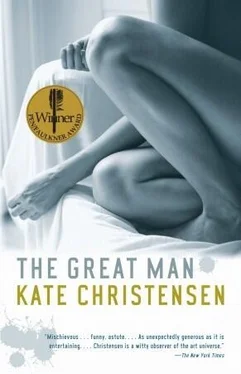“Remember,” said Jane, smiling. “You painted like a madwoman. You had something to prove. And the thing doesn’t look a bit like me.”
“It looks exactly like you!”
“That simpering wheat biscuit of a girl?”
“Is that how you see her?”
“How do you see her?” Jane asked.
“She’s thoughtful and lovely, yet she’s tough. Very much how I saw you at the time.”
“Hilarious,” said Jane. “Every time I visit that portrait, I marvel that it has anything to do with me.”
“It really had more to do with Oscar than with either of us,” said Maxine.
Maxine had painted the portrait of Jane by impersonating her brother, looking at Jane through his eyes. It had been more an exercise in identification than a technical challenge. She had reached back to her art-school training for the feints and finesses of making paint look like expression, gesture, living skin. These had come back to her surprisingly easily; the difficult part had been forcing herself to view Jane with Oscar’s predatory aggression. In particular, Oscar had had a way of painting women’s genitalia; he slightly exaggerated the labia, made the pubic hair just a little more copious than it could possibly have been. “Pussies are like faces,” he had once said to Maxine when she’d asked him about this. “No two are alike. I can tell you everything about a woman by looking at her cunt. I could set myself up as a cunt reader at a carnival and make a killing. Some look like little buttocks. Some are flowers. Some are oysters. Some are other things. They’re the focal point of every portrait, whether you can tell in the end or not. I start with a woman’s cunt and work from there. I hate it when she’s got so much hair you can’t see anything. Sometimes I ask my models to trim it away. Teddy’s an oyster, with long, ruffled inner lips. Abigail is a—”
“Shut the fuck up,” Maxine had told him.
According to Oscar’s taxonomy, Jane’s cunt was a flower; Maxine, impersonating Oscar, exaggerated the plumpness of her petal-like outer labia, emphasized the tiny protrusion of the inner lips, like the flirtatious tip of a tongue, the honey brown quiff of pubic hair that left the lips nearly bare and traveled down her inner thighs. Then she looked at Jane’s face as she had examined her genitalia: as representative of the whole woman, assertively idiosyncratic. When the portrait was finished, Maxine had the grimy, unsavory feeling that she understood her brother now better than she had ever wanted to. She’d scrubbed her hands afterward, and had kept scrubbing even after all the paint was gone.
Discussing this on the phone with Dexter earlier, she had, of course, said nothing along these lines; she had talked instead about seeing through Oscar’s eyes into the soul of her subject, trying to erase herself and become the woman she was painting. But it was all hogwash; the thing Oscar was famous for, she had discovered, wasn’t at all how he went about painting. He metaphorically and, for all she knew, literally raped his models with his brushes and somehow ended up evoking inner strength, an inviolable selfhood. Very odd. She still wasn’t sure why that happened, but she knew how he did it as no one else possibly could have.
“Yes, I was amazed that you saw me that way,” said Jane. “You seemed to be seeing some better version of me, or so I thought at the time, but then, I was excessively self-conscious when I was younger.”
“Did I idealize you back then?” Maxine asked with horror.
“God, I don’t know,” said Jane. “Honestly, I can’t remember back that far. I just know that painting is definitely worthy of Oscar. Brilliant. It’s satirical. Such a sly joke, making an über-WASP society girl portrait of a white-trash Southern Baptist like me, and then also passing your own dyke girlfriend off as one of your brother’s conquests…So clever, Max, just so stunningly smart. Class, gender, stylistic appropriation. And on top of that, by using Mercy as the model for Helena, in pairing the two paintings, you made both of them about race, as well.”
Maxine furrowed her brow.
“Good God!” said Jane. “Don’t disillusion me and tell me it was all unintentional.”
“I was just trying to win a bet,” said Maxine, taking a slug of whiskey. “I don’t know about all that other crap. Want a tuna sandwich?”
“In a bit,” said Jane. “Let me get a buzz on first.”
“Tell me about this boyfriend of yours,” said Maxine.
Jane took a sip of wine with the kind of smug, thoughtful little grin people used to attribute to the Cheshire cat from Alice in Wonderland, a book that had always given Maxine mental hives.
“All right, then,” said Maxine, “don’t tell me.”
“No no,” said Jane, “I like talking about him. It’s just that he’s very quirky. It’s hard to describe him.”
“I never knew you were bisexual,” said Maxine, trying to sound nonjudgmental, without accusation.
“I’m not,” said Jane. “I’m as gay as you are. It’s just that…”
“What’s his name?” Maxine asked, stifling a sigh.
“Sylvester Beely,” said Jane. “Syl, he’s called.”
“What’s he like? Sensitive and artistic, or manly and rugged?”
Jane laughed. “Well, he’s not…artistic, to say the least. Actually, he’s far more effeminate than you are. He calls himself a girl with a penis, and in many ways he is.”
“Oh,” said Maxine.
“But in some ways he’s quite rugged,” said Jane. “He’s not American…so his idea of masculinity is more complex and inclusive than that of most men who were born and raised here. He was born in Bombay to a Dutch father and an English mother, raised in India and Africa, schooled in England and at Harvard, where he got an M.B.A., and now he’s a self-made millionaire who retired early. He’s fifty-seven. A little younger than I am.”
“What does he do now that he’s retired?” Maxine asked through a welter of frustration.
“He coordinates charitable and humanitarian efforts for AIDS victims in the Third World. And when he’s not doing that, he goes white-water kayaking in Canada and studies ancient Greek. He’s working his way through Homer’s Odyssey in the original. He sounds too good to be true, doesn’t he? But he’s got a lot of mental problems, a lot of fragility, unresolved conflicts, demons…. He needs me desperately, which is as much a part of his appeal to me as the rest of it, his success, his intelligence. He’s a mess inside. His childhood was hell. His ambitions always kept him from the things he really wanted to do — find love, get married, have a family, emotional stability….”
“And you fulfill all his needs,” said Maxine. “You mother him; you fulfill his longing for intimacy.”
“No need to be snotty,” said Jane. Her tone was light, but her smile was sharp-toothed.
“Yeah,” said Maxine. “Well, after I saw you the other night, I kicked myself. I couldn’t remember why we broke up, to be honest.”
“Give me some more wine,” said Jane, holding up her glass.
Maxine poured a good dollop into her glass.
Jane leaned back and fingered the glass’s stem, looking up at the ceiling. “I was heartbroken by our affair, Max,” she said after a moment. “It took me years to get over you.”
“You were ? It did ?”
“You didn’t know?”
“I had absolutely no idea.”
“Oh yes. I was catatonic for a few months after you dumped me.”
“I dumped you?” Maxine felt as if she’d been plunked down in an alternate universe. She could feel how bug-eyed she looked. She was sick to her stomach with shocked regret.
“Well…” said Jane, still not looking at Maxine. “You said you didn’t want to see me anymore. I took that to mean I was being dumped. Perhaps I overreacted.”
Читать дальше












